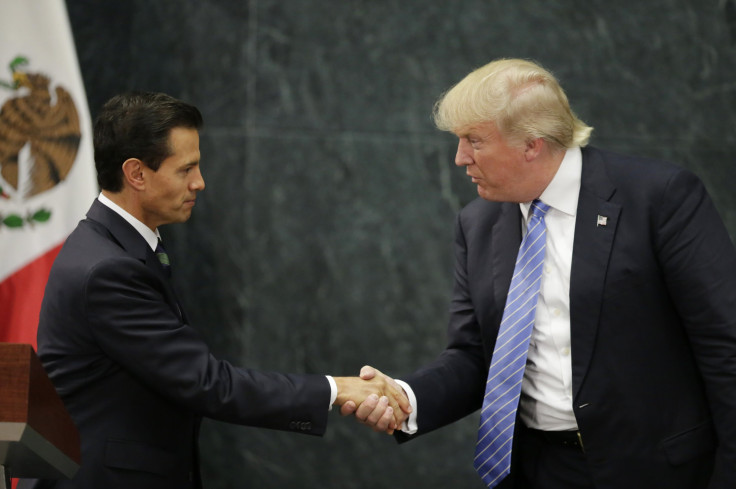Election Day 2016: Will Donald Trump's Presidential Run Help Democrats Win The House And Senate In November?

Donald Trump’s presidential run could potentially be a boon for Democratic House and Senate candidates, as the Republican nominee’s controversial immigration policy is expected to prompt a strong Latino turnout that may reshape Congress.
In a recent poll by Fox News Latino, only 20 percent of registered Latino voters would vote for Trump. There are 13.1 million Latino voters expected to vote in the election, a sharp uptick from the 11.2 million that voted in 2012.
Those figures may not bode well for Republicans competing for House and Senate seats, particularly in states with large Latino populations, as voters in presidential elections tend to vote along party lines.
Democratic candidates currently lead in enough states to take back the Senate. The New York Times’ The Upshot listed the Democrats’ chances of winning the Senate at 56 percent, which would be a dramatic reversal after the 2014 election, which yielded seven senate seats for the GOP.
The Senate is currently composed of 54 Republicans and 44 Democrats. The two independents are Bernie Sanders of Vermont and Angus King of Maine, and both mainly vote with Democrats.
Thirty-four of the 100 Senate seats are up for grabs in November. Presidential battleground states are expected to have stronger turnouts with both parties making big pushes for crucial electoral votes.
Florida, Colorado and Nevada have highly coveted Latino bases, and Trump has polled poorly in all three states. In April, The Hill cited that 80 percent of Latino voters in Colorado and Nevada voters were less likely to vote for Republicans due to Trump’s stance on immigration, while Latinos in Florida polled in at 68 percent.
With Democratic Minority Leader Harry Reid retiring, candidate Catherine Cortez Masto is looking to hold onto the seat in what is expected to be a tight race with Republican Rep. Joe Heck. A Suffolk University poll on Aug. 17 had Masto and Heck tied at 37 percent. Clinton owns a two-point edge on Trump in the same poll.
In Colorado, incumbent Democratic Senator Michael Bennet has a comfortable 16-point lead in the latest Quinnipiac poll. Bennet is facing Republican challenger Darryl Glenn, whose leanings are similar to Trump’s.
Florida, arguably the election’s most crucial swing state with 29 electoral votes, has Democratic candidate Patrick Murphy facing Republican incumbent Marco Rubio. Trump owns a slim two percent lead in a Florida Atlantic University poll, while Rubio leads Murphy by five points. But in other presidential polls, Clinton has a lead in Florida by as much as nine percent.
Any attempts from Trump's campaign to salvage some Latino support may be in vain. Republican pollster Whit Ayres believes Trump's harsh stance on immigration and his tough comments against Latinos can't be mended.
“You can’t denigrate a group for 15 solid months and turn around two months before the election and go, ‘Oh, never mind,’” Ayres told Politico. “It just doesn’t work that way.”
But will Latino voters turn out? In 2012, only 48 percent of eligible Latino voters actually voted, compared to 67 percent of whites and 64 percent of blacks.
However, Trump also may be hurting Republican candidates in states without a heavy Latino population.
In New Hampshire, a swing state that voted for former Republican president George W. Bush in the 2000 election, Trump trails Clinton by nine percent in a CBS News/YouGov poll and an earlier poll by WBUR/MassINC had Clinton leading by 17 percent. The Senate race has Republican incumbent Kelly Ayotte trailing Democrat Maggie Hassan in four of the last six polls, and by as many as 10 percentage points.
It’s unclear how Trump’s candidacy will impact the House, as the Democrats’ chances to overcome Republican leadership look much slimmer.
Republicans have 247 seats compared to 188 for Democrats, which represents their largest majority since the 1928 election. It would take an epic landslide by Clinton for the Democrats to reclaim the House, but the Democrats can at least narrow the margin.
There is still more than two months to go until the Nov. 8 general election, but Trump has an uphill battle to win the election, let alone help his party maintain the Senate and keep a strong majority in the House. In a four-way race with Clinton, Libertarian candidate Gary Johnson and Green Party candidate Jill Stein, Trump has trailed by as many seven percentage points in August.
© Copyright IBTimes 2024. All rights reserved.






















